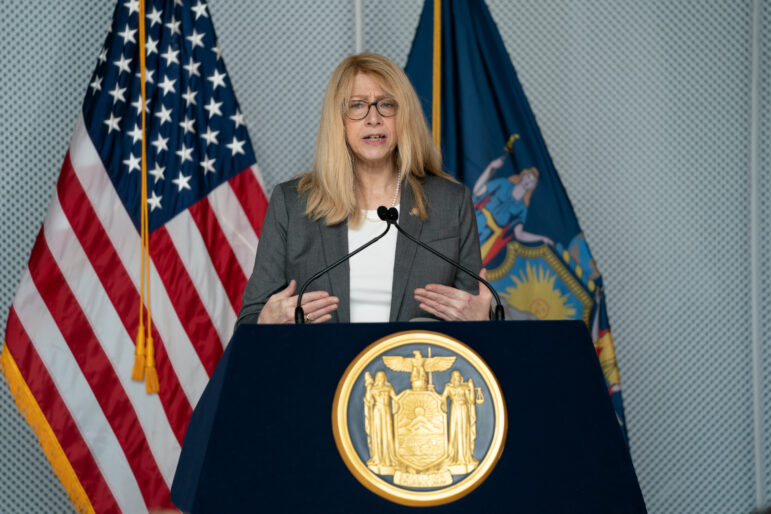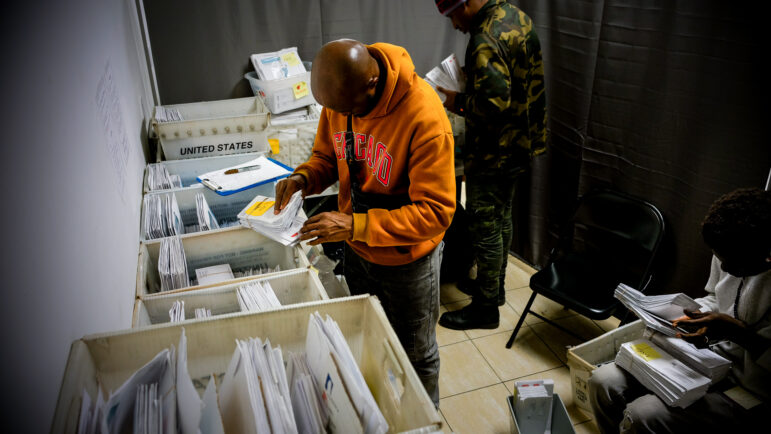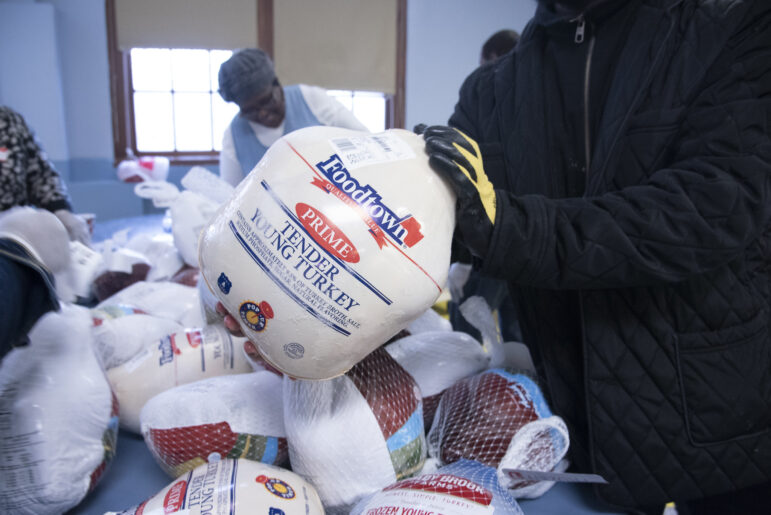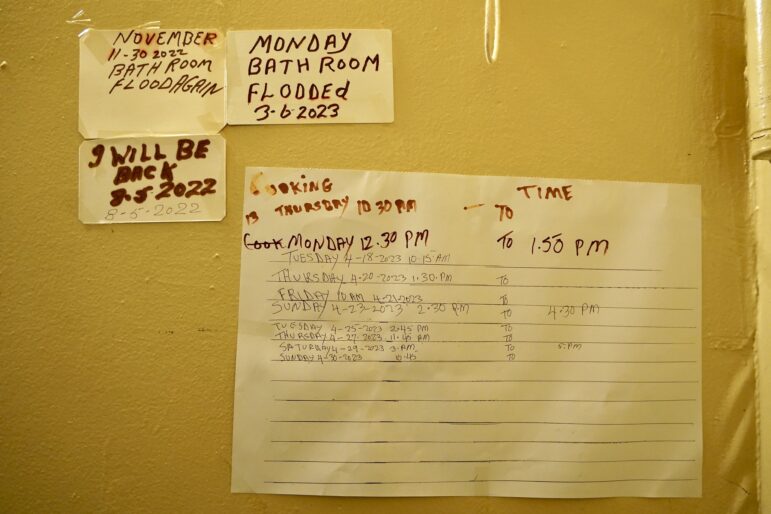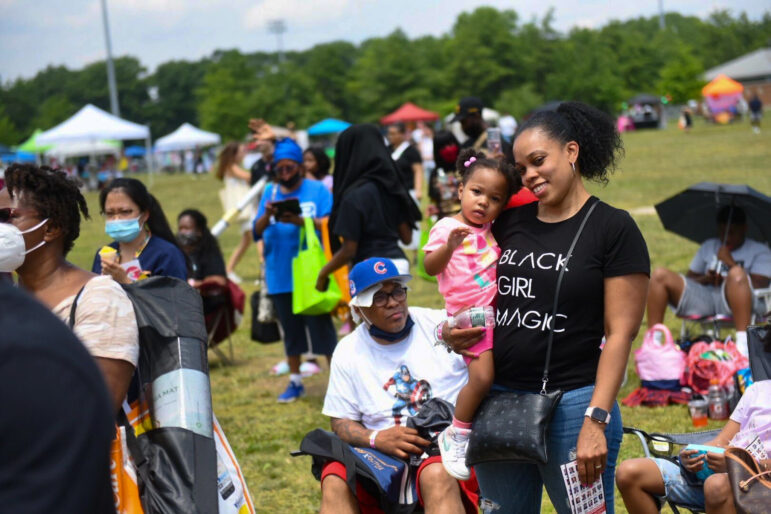Extreme heat from climate change has the potential to exacerbate racial disparities in the five boroughs’ maternal health outcomes. Still, climate change and maternal health often remain two separate policy conversations, both locally and nationally.
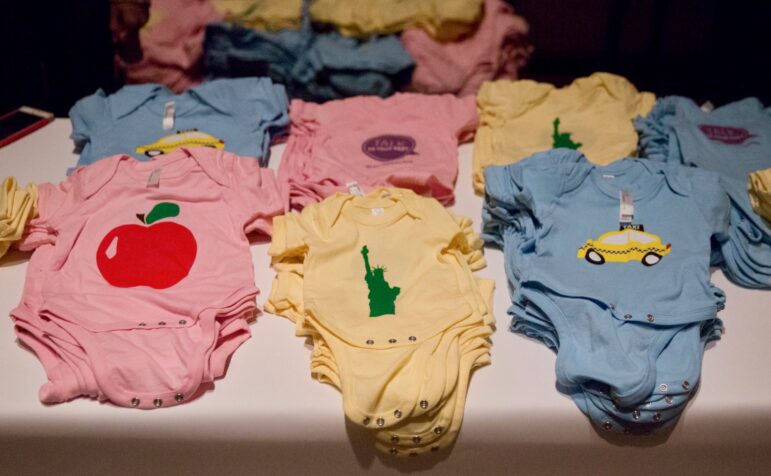
Michael Appleton/Mayoral Photography Office
This story was produced by student reporters in City Limits’ CLARIFY News program: Hamna Kanwal, Ilana Livshits, Maleea Mcphatter, Jillian Peprah-Frimpong, Robert Vanterpool and instructor Abigail Savitch-Lew.
Cheryl Ching, a social worker who lives in Brooklyn, is pregnant for the first time. During late July’s heat wave, she was about to enter her third trimester.
Each day was a tricky balancing act: she knew maintaining some physical activity was important for a pregnant person, but she also didn’t want to risk heat exhaustion. Changes she was already experiencing in her body—increased need for water consumption, swelling feet—could be exacerbated by too much heat. “The summer has had a big impact on my pregnancy,” she explained.
Asked if doctors had spoken to her specifically about heat-related precautions, Ching said they hadn’t.
While pregnant people may have an instinctive understanding of the risks their bodies face, there is still not much public conversation about the growing evidence that extreme heat can have a severe impact on pregnant people, their fetuses and young children. Those familiar with the research warn that stakeholders are overlooking the possibility that climate change will exacerbate maternal health outcomes.
“I think there is not enough attention, both in the public discourse [and] in the research funding space,” said Dr. Sabrina McCormick, a sociologist, climate scholar, filmmaker, and former professor at George Washington University.
Women of color, Black women in particular, already face disproportionately high rates of maternal mortality and premature birth, and are also disproportionately affected by and exposed to extreme heat. Planet warming could compound with other social determinants of health—including exposure to air pollutants, racial discrimination in healthcare institutions, and long-term levels of stress—to even further exacerbate negative Black maternal health outcomes.
Public lack of knowledge and mixed government response reveals there’s still work to be done to safeguard pregnant people against climate change. Some federal legislation remains stuck in subcommittees, while cities across the nation are only just beginning to specifically address pregnant people in heat and safety emergency plans.
City Limits interviewed various stakeholders including doctors, advocates, local government officials and climate scholars to find the root of inaction and understand how to mitigate this issue.
Science establishes clear risks
The United States has the highest maternal mortality rate among developed countries, with nearly 33 deaths per 100,000 live births, according to national statistics. As global temperatures rise, climate change-related exposures pose increasingly serious health effects for pregnant women, developing fetuses, and children.
Pregnant women who are exposed to heat have a harder time regulating their body temperature and are at higher risk of high blood pressure, eclampsia, and uterine bleeding. They are also more likely to have babies who are premature, underweight, or stillborn. In a systematic review covering almost 33 million U.S. births, four studies identified an association between exposure to heat and an increased risk of preterm birth, ranging from 8.6 to 21 percent.
Furthermore, a 2022 study published in the International Journal of Epidemiology unearthed a link between higher ambient temperatures and a decrease in fetal growth, including head circumference, birth weight, and abdominal circumference. Meanwhile, researchers Rupa Basu, Varada Sarovar, and Brian J. Malig conducted a study in California that found a 10.4 percent increase in risk of stillbirth for every 10-degree Fahrenheit increase in temperature during the state’s warm season.
And Nicole S. Ngo and Radley M. Horton’s study, conducted in New York City, demonstrated that a mother’s exposure to periods of extreme heat (as well as extreme cold) resulted in lower birth weights. A baby born prematurely or with a low birth weight is at a greater risk for complications. In the most severe cases, premature birth and low birth weight can result in death, and was one of the leading causes of infant mortality in the U.S. in 2020, according to the Centers for Disease Control and Prevention.
Regardless of whether they have a healthy birth experience, babies and young children are also among those most vulnerable to heat.
In children, the issue is both behavioral and physical. According to the United States Environmental Protection Agency (EPA), children are often unaware of their limit for physical activities during extreme heat, and they depend on others to keep them hydrated. Children also have a smaller ratio of body mass to skin surface area, making them more vulnerable to heat-related illness.
The Royal Women’s Hospital in Australia warns that young children may not show stereotypical symptoms indicating they are being affected by the heat; the child may only seem more irritated or unwell, or may have fewer wet diapers, drier skin, seem “floppy,” and refuse to drink. The fontanelle spot on their heads may be lower than usual.
For Black mothers, an environmental justice issue
Nationally, Black mothers are far more likely to die during pregnancy or shortly after birth than white women, while infant mortality rates for Black babies are more than double the infant mortality rates of white babies. Black babies are also about twice as likely as white babies to be born with a low birthweight.
Disturbing disparities exist in New York City: from 2001 to 2019, the pregnancy-related mortality ratio was on average 9.2 times higher for Black pregnant people compared to white people, as documented in the NYC Department of Health and Mental Hygiene’s 2019 Pregnancy-Associated Mortality report. While in 2021 New York City reported a decrease in the overall infant mortality rate, it remains much higher for Black babies, with rates 3.4 times higher than for white babies.
“We have to acknowledge that we are all not at the same level of risk,” said Bruce Bekkar, a women’s health physician who co-authored the systematic review linking air pollution and heat exposure with birth complications. (He is also a keynote speaker on climate issues and the co-host of Green Docs, a podcast committed to helping expectant mothers understand climate change’s impacts on health and pregnancy.)
To make matters worse, Black New Yorkers suffer from lower access to air conditioning, green spaces, and neighborhood cooling centers, according to city research, making them more vulnerable to the health impacts of extreme heat.
In 2019, Jiyoon Kim, Ajin Lee, and Maya Rossin-Slater conducted a study that examined the impact of extreme heat on birth outcomes for Black and white mothers living in the same counties. In general, results were worse for women who lived in historically cooler states like New York as opposed to historically warmer states.
In addition, the study concluded that “the effects on prenatal hospitalizations are much more pronounced for black than for white mothers,” suggesting that climate change could further exacerbate the Black-white maternal health gap.
Increasing national attention
Experts say that addressing these concerns will take a variety of actions, including mitigating climate change, educating the public, and creating specific policies to protect pregnant women and other vulnerable populations from extreme heat exposure.
“I think awareness-raising is a start,” McCormick said in an email, referring to how governments can address the extreme heat impacts on maternal health. “Overall worker protections providing breaks and water are important. Such policies should be modified to accommodate particularly vulnerable populations like pregnant women.”
The EPA has recognized the threat of climate change to pregnant women for several years. At least as early as 2014, the agency called for prioritizing pregnant people’s risks when creating climate change adaptation plans. Today, its Climate Change and the Health of Pregnant, Breastfeeding, and Postpartum Women webpage outlines how climate-related hazards, including but not limited to heat, can threaten maternal health. The EPA advises individuals to stay cool and hydrated, protect themselves from indoor and outdoor air pollution, and create a plan for natural disaster and extreme weather emergencies with their health care provider, among other action items.
Human Rights Watch, along with several other advocacy groups including Black Women’s Health Imperative, released a factsheet in 2020 that includes several national recommendations to ensure pregnant people’s needs are addressed in government disaster planning. The groups call on doctors and other birth workers to play a role in informing their patients about the risks of extreme heat, calling it a “reproductive justice issue.”
The following year, another coalition of groups including Human Rights Watch and at least 50 organizations called on President Biden to integrate maternal health concerns and racial inequalities in maternal health outcomes into the nation’s climate policy.
“We found that climate change is exacerbating long standing perinatal racial inequities, as people of color are most vulnerable to heat exposure,” said Carol Sakala, senior director for maternal health at the National Partnership for Women & Families, in an email. In 2021, in collaboration with the National Birth Equity Collaborative (now RH Impact), the group developed a project called Saving the Lives of Moms and Babies.
It recommends that Congress mandate and fund state Medicaid agencies to cover the purchase of technologies like air conditioners for pregnant people, along with subsidies to offset the costs of increased electric bills. It further calls on policymakers to take action to reduce climate change, create educational materials for pregnant workers on heat-related illnesses, and for Congress to pass an act requiring the Department of Labor to create safety standards to regulate exposure to indoor and outdoor heat.
The campaign pushed successfully to have Congress pass the Pregnant Workers Fairness Act (H.R. 1065), which was signed into law last year and mandates that employers provide health related accommodations for pregnant people, which could include accommodations for extreme heat conditions. The regulations are currently in development.
The groups also called for action on a second bill, Protecting Moms and Babies Against Climate Change Act (H.R. 957 / S. 423), which has been endorsed by more than 180 organizations and is part of Illinois Representative Lauren Underwood’s Black Maternal Health “Momnibus” Act.
It would develop a strategy to designate maternal health high-risk zones, and fund medical schools and community-based programs to address climate-related risks for pregnant people and babies. Additionally, it asks the National Institutes of Health to establish a “Consortium on Birth and Climate Change Research.”
But the Black Maternal Health Momnibus Act has remained stagnant since its introduction in 2021.
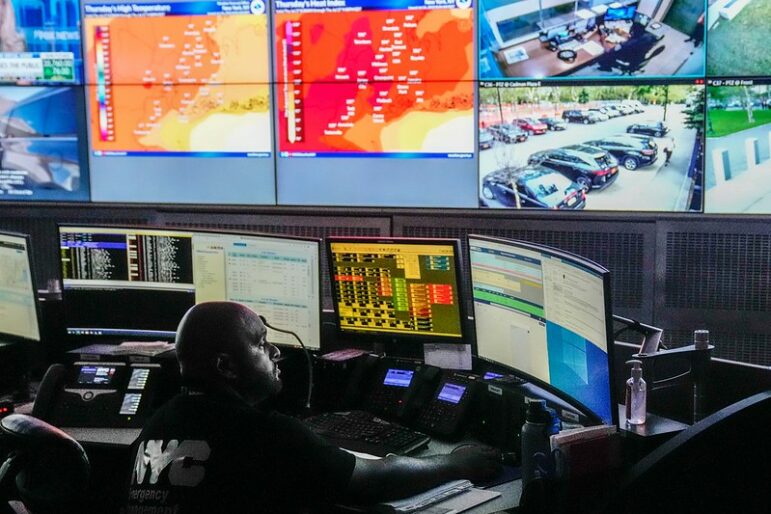
Michael Appleton/Mayoral Photography Office
Workers in the New York City Emergency Management command center monitoring heat condition on July 27, 2023.In NYC, gaps remain
In 2020, Buzzfeed conducted an analysis of 25 American cities’ heat and safety guidelines and discovered that only two, Chicago and Philadelphia, mentioned the particular vulnerabilities of pregnant people to heat. Similarly, a review conducted by Human Rights Watch that same year found that pregnancy health was “largely omitted from heat awareness efforts” across the largest cities in the United States, including New York City.
But things may be improving: New York City, at least, began adding guidelines for pregnant people in extreme heat in 2020 after the Human Rights Watch review was complete.
While pregnant people are not among those mentioned as vulnerable in the NYC Department of Emergency Management’s Extreme Heat: Beat the Heat! guidelines, they are mentioned on the NYC Health Department’s extreme heat “Emergency Prep” webpage as a high risk group. The page states that “an increase in body temperature may bring on labor, preterm birth or lower birth weight” and that “those who are pregnant should stay in a cool place, drink fluids and take it easy when it’s hot.” In a briefing during the late July heatwave, Health Commissioner Ashwin Vasan reiterated these warnings.
These past few years, local policy makers in New York City have honed in on Black maternal health outcomes, though the risks of extreme heat have not been mentioned specifically in those efforts.
In 2022 the Council, with leadership from Bronx Borough President Vanessa Gibson and Public Advocate Jumaane Williams, passed a package of bills to address long-standing systemic, racial inequities that affect maternal health. The legislation aims to ensure that expectant mothers, particularly mothers from marginalized communities, have access to relevant information, services and education related to pregnancy as well as sexual and reproductive health.
These bills include initiatives that could help protect pregnant people from a changing climate, such as a new education program that informs the public about pregnant people’s rights when it comes to workplace accommodations and family leave. However, with the exception of Williams’ resolution to support the federal “Momnibus” Act, the package of bills makes no references to climate or heat.
Both Gibson and Brooklyn Borough President Antonio Reynoso have made maternal health a priority issue in their respective boroughs, too. Reynoso allocated all $45 million of his office’s FY 2023 capital budget to three hospitals’ for maternal healthcare improvements, according to his website. He also formed a Maternal Health Task Force of eight Black women medical professionals and community advocates to address disparities in care, among other efforts.
Meanwhile, Gibson has formed the Bronx Maternal Health Consortium, is looking to launch a Birthing Center in the Bronx, and also penned a letter to Gov. Kathy Hochul this year urging her to support state bills that would improve access to doulas and cover their services under Medicaid and other health insurance plans.
Asked whether Reynoso’s office had given thought to the effect of extreme heat on maternal health, Press Secretary Isabel Panno Shepard told City Limits via email that “while extreme heat isn’t a primary focus of our maternal health work underway, it is part of a comprehensive planning effort the Borough President is advancing to address public health disparities like heat vulnerability and maternal mortality through a Comprehensive Plan for Brooklyn.”
She was referring to the borough president’s unfolding comprehensive planning effort, which, she wrote, “recognizes that our health is deeply intertwined with our environment—the quality of our housing, transit, language services, food access, nearby healthcare institutions, climate, etc. —and will look at disparities like heat vulnerability to identify what communities need in order to level the playing field and improve outcomes.” (The “Existing Conditions” portion of the plan discusses heat stress, among other public health concerns.)
Gibson’s office wrote to City Limits acknowledging that pregnant people are some of those most vulnerable to the impacts of climate change, and listed a number of ways her office is advocating to protect such populations in the Bronx from extreme heat, like issuing advisories during heat waves and pushing for the “Million More Trees” initiative.
“This is an area of great concern because The Bronx already suffers from poor health outcomes, and we rank #62 of 62 among all New York State counties,” the BP’s office wrote. “The effects of this increase fall disproportionately and more must be done to mitigate the heat dangers in these neighborhoods, to advocate for, and protect vulnerable groups.”
At large, however, climate change and maternal health often remain two separate conversations in our city and region.
Katonya Trent, a preterm birth advocate and social impact speaker on Long Island, said she hadn’t heard many people talking about the impacts of climate change on maternal health and infants, but believes it’s important to discuss.
“The government needs to do more to protect our women in society,” she said. “Simple things such as water, having air conditioning, or being able to have designated facilities where families who may not be able to afford air conditioning can be able to come in to sit for a few hours to cool off and stay out of the heat—[all] would be helpful.”
To reach the editor behind this story, email Jeanmarie@citylimits.org.



